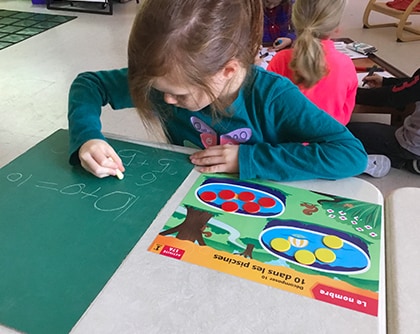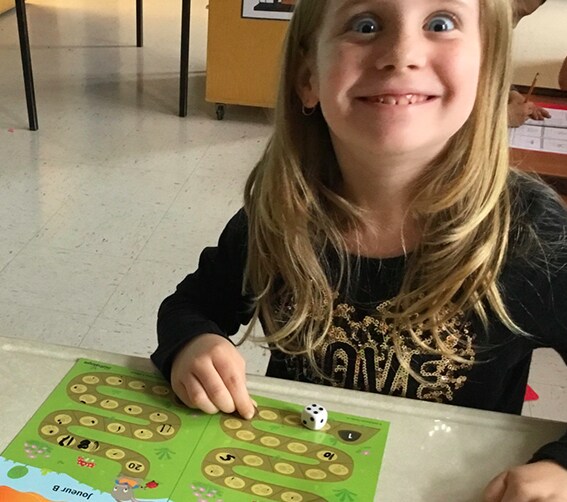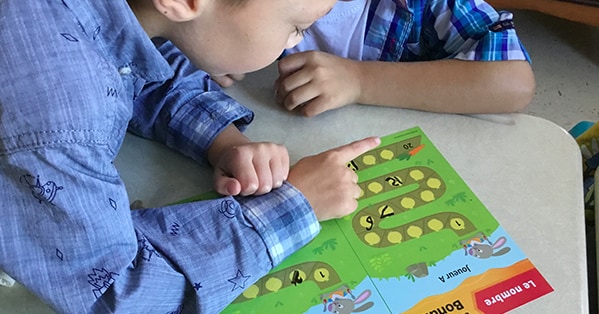Immersion teacher saves hours of daily prep time with Mathologie’s differentiated French resources
By Wendy McMahon
As an elementary level French immersion teacher, Jordan Sloan often struggled to find appropriate math resources. She spent hours every morning searching Pinterest and TeachersPayTeachers for resources only to then have to translate English resources into French or simplify the language in resources designed for students who speak French as a first language. And if she couldn’t find what she needed, she invested more hours in creating appropriate resources from scratch. When she finished, she still had to differentiate the content to meet her students’ varying ability levels.

But Sloan, an immersion teacher for a grade 1/2 split class at Herman Street Elementary School, in Petawawa, ON. says Mathologie resources solved her resource problems. A set of math resources adapted specifically for French immersion classrooms, Mathologie resources provide engaging activities and resources at appropriate language and ability levels.
Along with saving heaps of time in activity prep, Sloan says Matholgie’s activities and little books have also made differentiation easier, improved her students' math language skills and decreased students’ math anxiety.
“Saving planning time and being able to work at the right level of French and at the right level of math has made all the difference in my classroom. Mathologie’s resources do all of that, plus it’s the entire curriculum in a box ready to go!"
Jordan Sloan
Support for small group instruction and assessment
Sloan, who teaches mainly in small groups, uses Mathologie’s activities and little books daily for her math lessons. She uses a Mathologie little book, such as On Safari, as a whole class intro to a math topic such as counting-on for example. Afterward, she revisits parts of the little book with a small group of students while the rest of her class works on Mathologie activities in differentiated centres.
The biggest challenge I’ve seen them overcome is a lot of math anxiety. I’m not getting the same level of anxiety around math because it’s fun and hands on.
Jordan Sloan
When working with students Sloan uses Mathologie’s activity cards, to easily do a quick assessment of students’ learning and determine next steps. Each card breaks down the lesson into three parts, activation, a hands-on activity, and consolidation options.
“Right on the teacher’s activity cards you see the key questions to ask, the assessment strategies and the next steps,” explains Sloan. “The front of the card explains how to extend the activity for students who need more of a challenge or it explains strategies to try to support students who are struggling.”

Easing Math anxiety and supporting differentiation
Differentiation didn’t just mean extra work for Sloan it also created math anxiety in students. “They could tell when they were doing completely different activities,” she explains. “And immediately they would say, ‘I’m not good at math.’ Right off the bat in grade one, you don’t want that feeling or that attitude towards math.”
But with Mathologie’s resources Sloan says everyone can work on the same activity card and the same idea just in different groups and in different ways. Sloan uses Mathologie’s differentiation options—included in the teacher’s guide-—to easily modify centres based on students’ abilities.
“I can choose an activity that’s wordier for my stronger language group and something that’s more complex mathematically for my stronger math group, and then a less complex activity for groups that aren’t quite as strong. And it’s all differentiated for me already. It’s just a matter of pulling those activities out,” she explains.
“I’ve seen big changes. My kids are really strong in math because we’ve been using the Mathologie resources and I’ve also seen a big improvement in their math language.”
Jordan Sloan
Improvements in Math language and attitudes
After using Mathologie resources for a year, Sloan noticed growth in her students math skills. “I’ve seen big changes. My kids are really strong in math because we’ve been using the Mathologie resources and I’ve also seen a big improvement in their math language,” explains Sloan. “They can understand the questions, they can understand problems, what’s being asked of them with the activities. And they’re developing their informal mathematical language because they’re talking and interacting. It’s all very hands-on and activity-based.”
Students’ attitudes toward math have also changed. “The biggest challenge I’ve seen them overcome is a lot of math anxiety. I’m not getting the same level of anxiety around math because it’s fun and hands on. It’s an activity as opposed to ‘we’re doing math’. Some of the kids used to come in and say ‘oh math is so hard.’ I’m not getting that anymore.”

Students love reading Mathologie little books so much, they even use them during independent reading time. “My students who were resistant to French language are reading the little books during language arts time because they love math so much! Now developing the extra language piece because they went from not reading—because they had no interest in it—to wanting to read so they can know more about math.”
With benefits for students and teachers, Sloan says Mathologie resources are a permanent fixture in her classroom. “Saving planning time and being able to work at the right level of French and at the right level of math has made all the difference in my classroom."